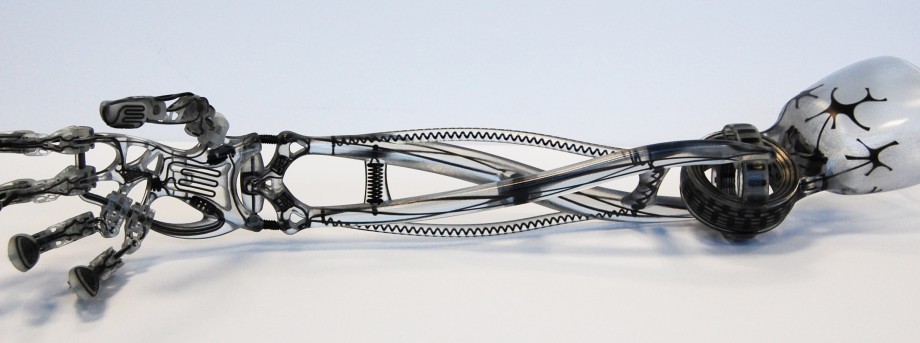The University of Nottingham
 Exchange online
Exchange online
Research Exchange
Landmark 3D printing exhibition showcases University research

Researchers at The University of Nottingham helped create a landmark exhibition at London’s Science Museum to showcase a technology that is transforming manufacturing.
Additive manufacturing or 3D printing has been termed a new industrial revolution. Using digital data, 3D printers print multiple thin layers of material such as polymer or metal, usually in powder form, which are then fused by lasers to form solid objects.
The technology allows levels of flexibility and customisation beyond traditional industrial methods and is revolutionising approaches to design and manufacturing.
The Additive Manufacturing and 3D Printing Research Group (3DPRG) at The University of Nottingham is recognised as the world’s leading research centre in the field and is a sponsor and adviser to the exhibition, 3D: printing the future, which opens at the Science Museum on Wednesday 9 October.
Student interns at Nottingham created one of the highlights of the exhibition — a 3D-printed functionalised prosthetic arm illustrating how the technology could evolve to print customised prosthetics with electronic moving parts and nerve endings.
Professor Richard Hague, Professor of Innovative Manufacturing and leader of the research group, said the University was delighted to support the exhibition.
The impact of additive manufacturing — so-called because it uses 3D printers to build up material — is growing rapidly. The wider availability of 3D printers and the prospect of goods being customised and printed at home or on the high street has further raised interest.
Suzy Antoniw of the Science Museum said: “We are indebted to Nottingham’s Additive Manufacturing and 3D Printing Research Group for all the support they have given to this exhibition. Professor Hague and his team guided us through the complex, evolving field of additive manufacturing and provided valuable advice, fascinating insights and intriguing objects. The prototype prosthetic hand developed by Richard and his students (and showcased in the exhibition) is a prime example of how 3D-printed innovations could transform people’s lives.”
As well as the prosthetic arm created in Nottingham, the exhibition features 3D-printed pharmaceutical tablets, one of a number of collaborations between 3DPRG and the University’s School of Pharmacy. Some of the printed tablets are bilayered, allowing two different drugs to be released at varying speeds according to individual patient need.
Professor Clive Roberts, head of the School of Pharmacy, said 3D printing of solid medicines at point-of-care offered personalised patient treatments beyond the scope of conventional mass manufacturing.
He added: “While there are many practical and regulatory issues to consider I firmly believe that 3D printing will be used in the medicines manufactured in the future.”
The Science Museum will also look at how engineers are using 3D printing to create lighter and more sustainable aerospace parts. This is being explored by Professor Hague’s team and the University’s Institute for Aerospace Technology.
Professor Hague said additive manufacturing would help transform the industrial landscape, with more emphasis on smaller, localised manufacturing.
He said Nottingham is leading research into the next phase of Additive Manufacturing: the 3D printing of mixed materials in multifunctional devices.
“At the moment 3D printing uses single materials, a polymer or a metal, which are fused together with a laser,” he said. “You can create interwoven geometries but they’re still passive. What we’re looking to do is activate those and make them functionalise. So rather than make a component you make the whole system — an example might be rather than print a case for a mobile phone you make the whole phone — all the electronics, the case, the structural aspects, all in one print.”
Professor Hague added that a key strength of the research group was its close collaboration with colleagues working in the physical sciences at the University. The researchers were recently awarded a £2.7m grant from EPRSC (Engineering and Physical Sciences Research Council) to work with the School of Pharmacy, which is investigating functionalised drug delivery through the 3D printing of pharmaceuticals.
Another exciting development is new research into the direct 3D printing of metal. “That will be globally unique — nobody else will be working on that,” said Professor Hague. “We are working with an industrial partner to develop a system that jets metal. At the moment you can only jet nano flakes of metal in a polymer ink.”
Leave a Reply
Other

Top prize for quantum physicist
A University of Nottingham physicist has won a prestigious medal from the Institute of Physics for […]

Zero carbon HOUSE designed and built by students comes home
Design and construct a low cost, zero carbon, family starter home, transport it to Spain, build […]